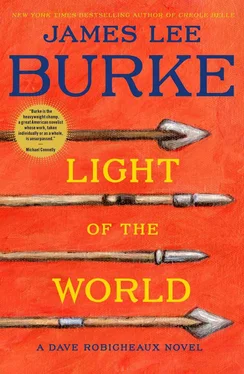“That’s my point. Do you remember her talking to an older man, maybe well dressed, with a comb-over, or a man who might own a big ranch, or maybe a family-type man?”
“Somebody she’d trust?” the owner said.
“Good, we’re on the right track.”
“That could be lots of people. Where’d you say you’re from?”
“Missoula. I told you.”
“You don’t sound like you’re from around here.”
“ I ain’t the issue. Did you have a guest here who might impress a young gal that’s tired of guys who are always trying to get in her bread?”
“Who the hell are you?”
“What do you care? I’m assisting the state. Try to imagine what that girl might be going through while we’re out here talking and squirting a garden hose on the rooftop.”
“There was a minister here. He was a nice fellow. I saw him helping a lady unload her vehicle and carry her things inside.”
“Where’s his church at?”
“He didn’t say. I remember Rhonda asking him. He said his church was the big one that didn’t have a name.”
“Which means he probably got his ordination off the Internet. What’d he look like?”
“His hair was kind of blond, like he’d been out in the sun a lot. He was clean-looking. He said he’d lost his daughter.”
“You got his name and tag number inside?”
“He paid cash, so I didn’t bother with the tag. I remember his name, though. I’d never heard it before. Reverend Geta Noonen. I said that was quite a name. He said, ‘You can’t ever tell who’s going to wander in from the storm.’ ”
“Remember what he was driving?”
“A gray SUV. Maybe a Blazer. It had some rust on one side. Who is he?”
Wyatt looked at the fire burning on the mountainside and the ash that floated like black thread out of the sky. “Maybe he’s just another rounder scamming a dollar or two out of ignorant people,” he replied. “Or maybe he’s just a guy that likes to get into a young girl’s panties.”
“I don’t like the way you talk.”
“Did you smell a peculiar odor in the room he slept in?” Wyatt asked.
The owner bit down on his lower lip.
“You think that fire up on the hillside is hot?” Wyatt said. “If you see that guy again, ask him what ‘hot’ is.”
The changing of the seasons in Louisiana — the changes taking place in the earth, if you wish — were predictable and followed the rules of cause and effect, regardless if the results were good or bad. Hurricanes brought floods; tornadoes destroyed towns; and tidal waves destroyed seawalls. The footprint of the Industrial Age was there in the form of canals that channeled millions of gallons of saline into freshwater marsh and poisoned the root system that bound the wetlands together.
Montana was different. Friday evening at sunset, I sat on the deck with Albert and Molly and Alafair and watched dry lightning strike in three places on a distant ridge. In under fifteen minutes, I saw three narrow columns of black smoke rising from the woods, straight up into a windless pink-tinted sky. The spring had been long and cold, with more than average rainfall, and snow was packed deep inside the trees on the peaks of the Bitterroots. How could a green forest, one damp with snowmelt, be set ablaze so easily?
“Because we’ve been in a drought since 1990,” Albert said. He was drinking Scotch and soda, more of it than he should. “Because insects kill more trees than wildfires do. The drought arrives first, then the pine beetles. Dry lightning provides the ignition. There’re places over in Idaho that look like they were sprayed with Agent Orange.”
“I think I’ll take a walk. How about you?” I said to Molly and Alafair.
“Maybe Albert might like to go,” Molly said.
“Dave thinks I rain on parades,” Albert said.
“He does not,” Molly said.
“Go on. I’m going to fix another drink,” he said.
We walked down the long drive and under the arch onto the road. The temperature was dropping, the sun’s afterglow fading beyond the mountains.
“Why didn’t you invite Albert to come along?” Molly asked.
“He’s in one of his moods. I didn’t want to get into an argument with him.”
“This is the third anniversary of his wife’s death.”
“I didn’t know that.”
“He told me this afternoon.”
“I’ll go back.”
“No, he’ll be all right. Don’t let him think we feel sorry for him.”
“No, I was wrong. I’m not going to drop it,” I said.
I walked back up the driveway. The valley was almost completely dark. I could hear the chain tinkling on the gate and the horses nickering and bolting in the north pasture. The wind had come up and was blowing in the cottonwoods by the creek bed, but I couldn’t smell smoke or detect any other cause that might agitate the horses.
When I reached the top of the driveway, I saw the flashlight beam bouncing along the ground behind Albert’s office. “What are you doing?” I said.
Albert pointed the flashlight beam below the windows that ran along the back of the house. “I thought I saw a man out here,” he said.
“When?”
“Two minutes ago.” He walked closer to me, shining his light up into the trees on the hillside. I could smell the Scotch on his breath and the heat trapped in his flannel shirt.
“Where did he go?” I asked.
“When I came outside, there was nobody here.”
“Sometimes the wind makes shadows on the grass,” I said.
“I never saw a shadow run. Take a look at this.”
He pointed the light down at an area between the lilac bushes and a bathroom window. I could see two funnel-shaped tracks stenciled deeply into the compost.
“Those look like they belong to a dog or a coyote,” I said.
“No, they’re too big.”
“A wolf?” I said.
“Yeah, I think that’s Brother Wolf’s prints, all right.” He moved his light around the base of the lilacs and out onto the belt of lawn between the house and the hillside. “Here’s the problem. There’re only two of them.”
“Say again?”
“Two paw prints. They’re three inches deep in the soil. You can see the points of the nails. There was a heavy animal here. But it left only two impressions. How is that possible, unless it was standing up? Besides, I didn’t see an animal out here. I saw a man.”
“Maybe it’s time to cork the jug for the evening,” I said.
“Don’t you be talking down to me like that, Dave.” He swept the flashlight beam across the tree trunks, illuminating boulders that were half buried in the soil. “I always said this was bloody ground. Why is it we think we can destroy a whole race of people and not pay a price for it?”
“ We didn’t do it.”
“Like hell.” He clicked off the light. “I’m going inside. It’s cold out here.”
I didn’t believe in wolves that stood on their hind legs to look through bathroom windows, any more than I believed in Wyatt Dixon’s claim that a goat-footed creature out of a medieval book on demonology had taken up residence in the cave behind Albert’s house. At least that’s what I told myself. Regardless, I couldn’t sleep that night. In this case, the source of my insomnia was simple: I feared for Alafair’s life.
On the late-night news, there had been a follow-up story on the waitress who had gone missing. A silver bracelet with her name inscribed inside it had been found by a fisherman on a flat rock in the middle of the St. Regis River. There was no explanation as to how it had gotten there.
In my opinion, the abduction was the work of Asa Surrette. He had placed one of his trophies on the rock to confound his pursuers. He was one of those serial predators who controlled both his victims and his adversaries by stoking their imaginations, leading them up a cul-de-sac, making them resent themselves for their powerlessness and the suffering he brought into their lives. Surrette wanted to instill as much pain as possible in the friends and family of the victim. Until her body was discovered, they would get no rest, find no peace, and be tormented by every dark possibility imaginable each time they closed their eyes.
Читать дальше












